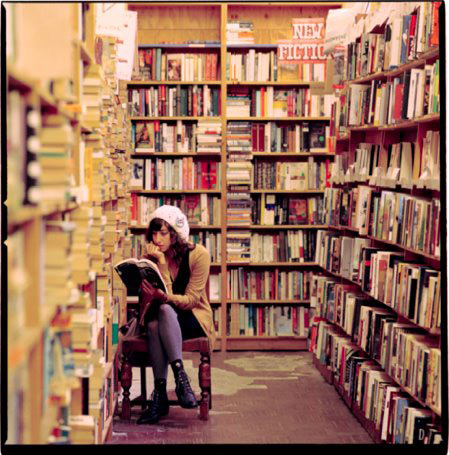當前位置: Language Tips> 英語學習專欄
分享到
如果讓你休閑時選擇去一個地方,并只有一天時間,你會選擇去哪里呢?博物館、游樂園或購物中心?本文的作者從大學時代便與圖書館結緣,直至后來在法國教書再到津巴布韋工作。每到一個地方,她總會被當?shù)貓D書館所吸引,圖書館就像她的心靈歸宿。她人生中每個故事都是圍繞圖書館展開,冥冥之中圖書館就像一盞指路燈引領她走過豐富而有意義的人生路。

By Kate Chambers
吳悠 選 溫純 注
I am sitting in a car in the Swedish capital of Stockholm with my baby sister and her husband of four days.
“Where do you want to go?” Edie asks.
It’s drizzling. This beautiful city, where sailboats and cruise ships plow past at what seems to be an arm’s length away, is mine for just one more day. Then I must head back to Africa.
“Where is the library?”
If Johan is surprised, he doesn’t show it. “Not far. It’s a great place. It was designed by a famous architect, Gunnar Asplund.”
Johan stops outside a building with a chunky central tower. It is ocher red, making me think suddenly of the rich clay soil back in Zimbabwe.
We slip inside. My first impression is of light and space. People tap away at small workstations. The books, shelf after glorious shelf of them, line the walls, like upended LEGO bricks.
Edie, my fashion-designer sister whom I see so rarely, is by my side.
“I presented one of my collections here,” she whispers. “The models came down from that middle bit, where the light is.”
She’s just given me another snippet to add to my library anthology.
For as long as I can remember, libraries have been the stages where my stories unfold. That imposing university library in England, for instance, in which I whiled away so many hours reading up on Dante, Boccaccio, and that medieval French writer I nearly dedicated my life to.
It’s been more than a decade and a half since I flashed my library card for the last time there. I recal—how could I forget?—the hush of the reading room, the chilly rabbit warrens of “book stacks” (open-access shelves) you could lose yourself in.
But my sharpest memory is of my friend Clare and the Marmite sandwiches she and I shared on the steps of that library on Saturday mornings. As we waited for her Colombian fiancé to cycle to meet us, we batted our dreams back and forth: Should we do doctorates once we’d finished our master’s theses? Or should we stop there, turn our backs on the siren call of the university library, and step out into the “real” world?
Clare stayed on. Happily for me, the world beyond that particular library turned out to be full of libraries, too.
In Nice, southern France, where I spent a sun-splashed year teaching English, I knew and loved a dark little library far off the beaten tourist track. It stood in a housing project where youths threaded their way through the gray towers on skateboards.
Marie, the mother of a friend, tut-tutted at their acrobatics as she made her weekly trip to the library to feed her passion for historical novels. Then, books in hand, she and I would take an elevator seven floors up to her apartment where we sipped tisane, an herbal tea, and nibbled sables, flat French cookies.
Later, living in Paris, I rode the escalators up the see-through tunnels to the library in Pompidou Centre. Sometimes after a shift distributing photocopies of page layouts in the newsroom of the now-defunct International Herald Tribune, I sat among the earnest French students leafing through books about film.
I wasn’t quite sure where the photocopies would take me. But I believed they’d take me somewhere.
These days I hop into a taxi several times a month and head for a small, sparsely stocked library in Sakubva, a township in Mutare, in eastern Zimbabwe.
Taxi driver Wellington fills me in on family news and asks after my father-in-law. We dip under the Coca-Cola Bridge. Fuchsia-pink bougainvillea bushes and flourishing vegetable gardens flash past the window.
The Sakubva Library and Technology Centre is next to what was until recently a school exam coaching center. I can hear the shouts from a nearby game of netball .
Wellington and I unload the latest box of books that well- wishers – a fair proportion of them readers of this newspaper – have sent to Zimbabwe, where books are scarce and expensive.
The assistant librarian comes toward me, clapping his hands in thanks.
The Sakubva library is where stories will happen and memories will be made – for me and for many other readers.
Vocabulary
1. drizzle: 下毛毛細雨。
2. 我將在這個漂亮的城市多呆一天,帆船和游艇在觸手可及的地方破浪而行。cruise ship: 游船;plow: 破浪前進。
3. chunky: 粗短的。
4. 外墻是赭紅色的,讓我突然想起津巴布韋盛產(chǎn)的粘土。ocher: 赭色;clay soil: 粘土。
5. tap away: 敲打電腦鍵盤。
6. 壯觀的書架一排連著一排,靠墻站立,像倒置的樂高積木。upended: 顛倒的,倒放的;LEGO: 樂高玩具積木。
7. fashion-designer: 時裝設計師。
8. collection: 服裝系列。
9. snippet:(消息、新聞等的)片段;anthology: 文選,詩選。
10. unfold: 展開,開始。
11. 比如我在英格蘭讀書時那座恢宏的大學圖書館,我在里面消磨掉不少時光,讀但丁,讀卜伽丘,還有那位我一生都在研讀的中世紀法國作家的作品。imposing: 壯觀的,氣勢宏偉的;while away: 消磨時間;read up to: 研讀;Dante: 但丁,意大利詩人;Boccaccio: 卜伽丘,文藝復興時期意大利作家,《十日談》的作者;medieval: 中世紀的。
12. 我回想起——我又怎么會忘記呢?——那個肅靜的閱覽室,那片陰冷的立有密密麻麻書架的區(qū)域(存取開放書架),讓人沉浸其中。chilly: 寒冷的;rabbit warren: 文中指密集雜亂的區(qū)域。
13. Marmite: 馬麥醬,英國的一種酵母醬,用于涂抹食品或制調味品。
14. doctorate: 博士學位;theses: 學位論文。
15. turn one’s backs on: 不理睬,背棄;siren call: Siren是希臘神話里面的美人魚,美若天仙,但以吃人為生。她們被囚禁在一個島上,為了引誘路過船只的水手們上岸吃掉他們,她們唱出天籟般的歌聲。“siren call”用來指誘人的召喚,致命的誘惑。
16. 我在法國南部陽光充沛的尼斯教了一年英語,在一個遠離游客的僻靜地方找到一間黑暗的小圖書館。beaten: 踏平的這里指游人絡繹不絕的。
17. 圖書館坐落在一處住宅區(qū),年輕人總是踩著滑板穿行于灰色的高樓之間。housing project: 住宅區(qū);thread: 穿過,穿行;skateboard: 滑板。
18. 我朋友的母親瑪麗,每周會去圖書館閱讀她喜愛的歷史小說,每當看到這些年輕人的“特技表演”,她就發(fā)出厭惡的嘖嘖聲。tut-tut:(書面語中表示反對、厭煩、同情等發(fā)出的)嘖嘖聲,咂嘴聲;acrobatics: 雜技技藝;雜技表演。
19. 然后我和她手里拿著書,乘坐電梯上到七樓,在她的公寓里,我們一起啜飲草藥茶,品食扁平的法式曲奇。tisane: 草藥茶;nibble: 一點點地咬。
20. see-through tunnel: 透明通道;Pompidou Centre: 蓬皮杜中心,坐落于法國巴黎波堡區(qū)的現(xiàn)代藝術博物館。
21. defunct:(指做法、法律等)不再使用的,不復存在的;International Herald Tribune: 《國際先驅論壇報》是一份英文國際性報紙,總部設在巴黎。現(xiàn)屬于紐約時報公司全額擁有,已更名為《國際紐約時報》(International New York Times)。leaf through: 快速地翻閱。
22. sparsely stocked: 藏書量不多的。
23. 淺蓮紅色的葉子花叢和繁茂的菜園在車窗外飛馳而過。fuchsia-pink: 淺蓮紅色;bougainvillea: 葉子花。
24. netball: 無擋板籃球(一種流行于英國等國家的女子籃球)。
25. 我和惠靈頓把最后一箱書卸下來,那是好心人——相當部分是該報讀者——捐贈給津巴布韋的,該國家書籍十分稀缺和昂貴。
(來源:英語學習雜志 編輯:丹妮)
上一篇 : 人情練達即文章
下一篇 :
分享到
關注和訂閱


翻譯
關于我們 | 聯(lián)系方式 | 招聘信息
電話:8610-84883645
傳真:8610-84883500
Email: languagetips@chinadaily.com.cn